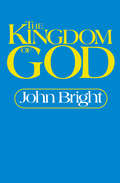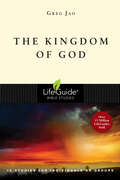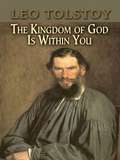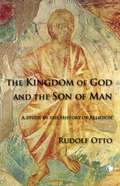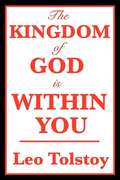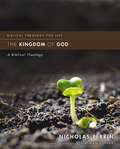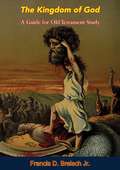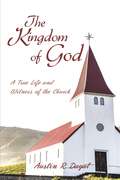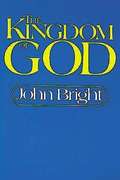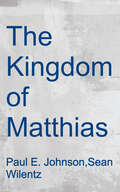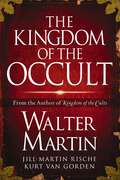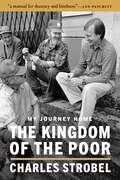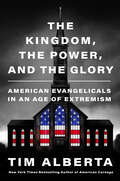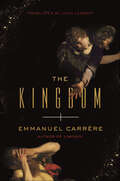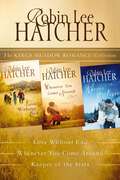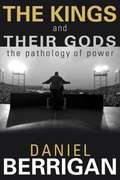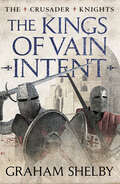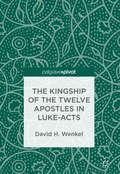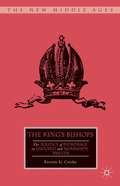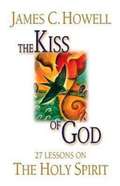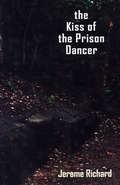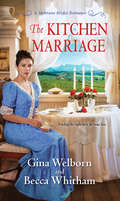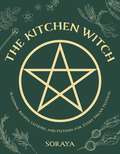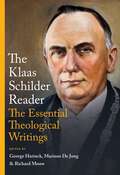- Table View
- List View
The Kingdom of God
by John BrightThis book traces the history of the biblical idea of the Kingdom of God and suggests its contemporary relevance. “To grasp what is meant by the Kingdom of God is to come very close to the heart of the Bible’s gospel of salvation.”—from the Preface
The Kingdom of God (LifeGuide Bible Studies)
by Greg Jao®PDF download with a single-user license; available from InterVarsity Press and other resellers.
The Kingdom of God Is Within You: What Is Art? What Is Religion?
by Constance Garnett Leo TolstoyBanned in Russia, Tolstoy's The Kingdom of God Is Within You was deemed a threat to church and state. The culmination of a lifetime's thought, it espouses a commitment to Jesus's message of turning the other cheek. In a bold and original manner, Tolstoy shows his readers clearly why they must reject violence of any sort--even that sanctioned by the state or the church--and urges them to look within themselves to find the answers to questions of morality.In 1894, one of the first English translations of this book found its way into the hands of a young Gandhi. Inspired by its message of nonresistance to evil, the Mahatma declared it a source of "independent thinking, profound morality, and truthfulness." Much of this work's emotional and moral appeal lies in its emphasis on fair treatment of the poor and working class. Its view of Christianity, not as a mystic religion but as a workable philosophy originating from the words of a remarkable teacher, extends its appeal to secular and religious readers alike.
The Kingdom of God and the Son of Man: A Study in the History of Religion
by Rudolf OttoThis work, originally published in German as Reichgottes und Menschensohn, created an even greater impression, and has had to be reckoned with in all subsequent studies of the person and work of Jesus Christ, particularly from the point of view of his 'Messianic self-consciousness'. The first English translation was published in 1938 and the present volume is a reprint of the substantially revised edition of 1943. Translated by Floyd Filson and Bertram Lee-Wolff.
The Kingdom of God is Within You
by Leo TolstoyThe soul-searching book that inspired Gandhi to embrace the concept of passive resistance, Tolstoy's 1894 polemic outlines a radical, well-reasoned revision of traditional Christian thinking. The revered novelist and political thinker denounces violent revolution, calling upon readers to rely upon their inner divinity for the strength to effect social change.
The Kingdom of God: A Biblical Theology (Biblical Theology for Life)
by Nicholas PerrinIn the last hundred and fifty years the kingdom of God has emerged as one of the most important topics in theology, New Testament studies, and the life of the church. But what exactly is the kingdom of God? What does it mean for the people of God and what does it mean for how they live in the world?In The Kingdom of God, part of the Biblical Theology for Life series, Nicholas Perrin explores this dominant biblical metaphor, one that is paradoxically the meta-center and the mystery in Jesus' proclamation. After survey interpretations by figures from Ritschl to N. T. Wright, Perrin examines the "what, who, and how" questions of the kingdom. In his sweepingly comprehensive study, Perrin contends that the kingdom is inaugurated in Jesus' earthly ministry, but its final development awaits later events in history. In between the times, however, the people of God are called to participate in the reign of God by living out the distinctly kingdom-ethic through hope, forgiveness, love, and prayer.X
The Kingdom of God: A Guide for Old Testament Study
by Francis BreischIn The Kingdom of God, which was first published in 1959, author Francis D. Breisch Jr. himself perfectly summarizes the message of the Old Testament: “It exhibits the unity which exists in the Old Testament. It shows the historical development of God’s work of redemption. It emphasizes the fact that the entire Old Testament prepares for the coming of Christ, the eternal King. To trace the growth of the Kingdom of God is to keep one’s finger on the pulse of God’s redemptive program. Throughout the guide I have attempted to point out the various ways in which the Kingdom of God comes to expression in the Old Testament.”In his own words, Francis D. Breisch Jr.’s book is geared towards the high school student—“reflected in both form and content”—but readers of all ages will find this volume extremely informative in its expression of the way in which God’s kingdom developed over the centuries.
The Kingdom of God: A True Life and Witness of the Church
by Austin R. DayalAfter proclaiming that God's Kingdom had come near, Jesus died on the cross. This is hard to reconcile with what Jesus announced at the start of his ministry. It can only be understood when we realize the relationship between the Kingdom of God and his death. Jesus said flesh and blood can't inherit the Kingdom of God, but only those who are born of the Sprit, and for this reason Jesus had to die on the cross. Jesus explained this to Nicodemus that only those who are born of the Holy Spirit can enter into the Kingdom of God. He came into the world to make it happen, because without the cross of Jesus there is no fulfillment of the Kingdom. The proclamation of Jesus, his works and his life have strong bearing on his mission. <P><P>Jesus proclaimed that the Kingdom of God had come near. He healed the sick, fed the hungry and gave hope to the poor. He lived a very basic life with his disciples and had no earthly possessions. This was the Kingdom that Jesus proclaimed. It gave the power back to the people, it gave them dignity and a life of joy and contentment. It was about the wellbeing of the whole community and where the leaders served others. Jesus explained the mysteries of his Kingdom through many parables, which turned the whole concept of the kingdom on its head and only a few were able to understand it then, as it is now. <P><P>It was a new and unique concept for the disciples to grasp, but after his resurrection when he was with them for forty days, Jesus explained everything to them as recorded in the book of Acts. He instructed them to remain in Jerusalem till they were baptized by the Holy Spirit. Their empowerment which is usually understood in terms of Peter's bold preaching of the gospel was in fact more than that. It was to give them the courage to leave their earthly possessions and relationships and accept the other believers as their new family, where God lived with them and looked after their daily needs, spiritual as well as material. This was a very bold step for them to take. It was more daring than standing up to preach before a large crowd on the day of the Pentecost. <P><P>The first church in Jerusalem became a place where God's Kingdom had come. They rejoiced together as they shared everything and God did mighty works among them. This would not have been possible, if they hadn’t left their own families and possession to join the new community of God’s people. The church lost the initial impetus that the early Christians had, in the way they lived and preached the good news of the Kingdom, especially during the post-Constantine period when the church leaders were seduced by the wealth that came from the state treasury. The way Jesus, the apostles and the early Christians had lived was completely forgotten or overlooked. <P><P>The sixteenth century reformation tried to recover some of the important aspect the Christianity but it did not go far enough. At present the church has become its own worst enemy. Some churches are trying to destroy the very foundation of our salvation by denying the existence of historical Jesus. In others the faith in Jesus has failed to translate into a living reality. It judges the world harshly and does not reflect the values of God's Kingdom in its daily life. We need to reaffirm the apostolic faith and the community life of the early church. And become a community of God’s redeemed people who follow the principles of his Kingdom. This is the true life and witness of the church.
The Kingdom of God: The Biblical Concept and Its Meaning for the Church
by John BrightJohn Bright's book arises out of a concern to find a unity between the Old Testament and the New Testament (p. 10) which will save the Bible, especially the Old Testament, from disuse and misuse (p. 9). The aim of his book is to show that such a unity exists.
The Kingdom of Matthias: A Story of Sex and Salvation in 19th-Century America
by Paul E. Johnson Sean WilentzIn the autumn of 1834, New York City was awash with rumors of a strange religious cult operating nearby, centered around a mysterious, self-styled prophet named Matthias. It was said that Matthias the Prophet was stealing money from one of his followers; then came reports of lascivious sexual relations, based on odd teachings of matched spirits, apostolic priesthoods, and the inferiority of women. At its climax, the rumors transformed into legal charges, as the Prophet was arrested for the murder of a once highly-regarded Christian gentleman who had fallen under his sway. <p><p>By the time the story played out, it became one of the nation's first penny-press sensations, casting a peculiar but revealing light on the sexual and spiritual tensions of the day. In The Kingdom of Matthias, the distinguished historians Paul Johnson and Sean Wilentz brilliantly recapture this forgotten story, imbuing their richly researched account with the dramatic force of a novel. In this book, the strange tale of Matthias the Prophet provides a fascinating window into the turbulent movements of the religious revival known as the Second Great Awakening--movements which swept up great numbers of evangelical Americans and gave rise to new sects like the Mormons. Into this teeming environment walked a down-and-out carpenter named Robert Matthews, who announced himself as Matthias, prophet of the God of the Jews. His hypnotic spell drew in a cast of unforgettable characters--the meekly devout businessman Elijah Pierson, who once tried to raise his late wife from the dead; the young attractive Christian couple, Benjamin Folger and his wife Ann (who seduced the woman-hating Prophet); and the shrewd ex-slave Isabella Van Wagenen, regarded by some as "the most wicked of the wicked." None was more colorful than the Prophet himself, a bearded, thundering tyrant who gathered his followers into an absolutist household, using their money to buy an elaborate, eccentric wardrobe, and reordering their marital relations. By the time the tensions within the kingdom exploded into a clash with the law, Matthias had become a national scandal. <p><p>In the hands of Johnson and Wilentz, the strange tale of the Prophet and his kingdom comes vividly to life, recalling scenes from recent experiences at Jonestown and Waco. They also reveal much about a formative period in American history, showing the connections among rapid economic change, sex and race relations, politics, popular culture, and the rich varieties of American religious experience.
The Kingdom of the Cults: An Analysis of the Major Cult Systems in the Present Christian Era
by Walter Ralston MartinUpdated regularly, this book continues to be a crucial tool in counter-cult ministry and evangelism for teachers and pastors as well as lay Christians.
The Kingdom of the Occult
by Walter Martin Jill Martin Rische Kevin RischeThe Kingdom of the Occult delivers the timely followup to Dr. Martin's best-selling The Kingdom of the CultsThis book takes Dr. Walter Martin's comprehensive knowledge and his dynamic teaching style and forges a strong weapon against the world of the Occult-a weapon of the same scope and power as his phenomenal thirty-five year bestseller, The Kingdom of the Cults (over 875,000 sold). Chapters include: Witchcraft and Wicca, Satanism, Pagan Religions, Tools of the Occult, Demon Possession and Exorcism, Spiritual Warfare, etc.Features include:Each chapter contains: Quick Facts; History; Case Studies; Theology; Resources
The Kingdom of the Poor: My Journey Home
by Charles StrobelAs Charles Strobel, beloved Nashville priest and champion of the unhoused, reached the end of his life in 2023, he began to contemplate the last message he wanted to leave his family, friends, and community. With the help of his niece, Katie Seigenthaler, and his colleague, Amy Frogge, Strobel began to dictate The Kingdom of the Poor. He wrote, &“Mark Twain, the great American folk hero and writer, has said, &‘The two most important days of your life are the day you are born and the day you find out why.&’ The following pages help to explain why I was born.&” The &“why&” of Charlie Strobel&’s life, which was devoted to helping those without support systems and homes to call their own, was a simple belief that we are all poor and we are all worthy of love.The Kingdom of the Poor is the story of the people and experiences that led him to this understanding and inspired him to live his life accordingly.
The Kingdom, the Power, and the Glory: American Evangelicals in an Age of Extremism
by Tim AlbertaThe award-winning journalist and staff writer for The Atlantic follows up his New York Times bestseller American Carnage with this timely, rigorously reported, and deeply personal examination of the divisions that threaten to destroy the American evangelical movement. <p><p> Evangelical Christians are perhaps the most polarizing—and least understood—people living in America today. In his seminal new book, The Kingdom, the Power, and the Glory, journalist Tim Alberta, himself a practicing Christian and the son of an evangelical pastor, paints an expansive and profoundly troubling portrait of the American evangelical movement. Through the eyes of televangelists and small-town preachers, celebrity revivalists and everyday churchgoers, Alberta tells the story of a faith cheapened by ephemeral fear, a promise corrupted by partisan subterfuge, and a reputation stained by perpetual scandal. <p><p> For millions of conservative Christians, America is their kingdom—a land set apart, a nation uniquely blessed, a people in special covenant with God. This love of country, however, has given way to right-wing nationalist fervor, a reckless blood-and-soil idolatry that trivializes the kingdom of Jesus Christ. Alberta retraces the arc of the modern evangelical movement, placing political and cultural inflection points in the context of church teachings and traditions, explaining how Donald Trump's presidency and the COVID-19 pandemic only accelerated historical trends that long pointed toward disaster. Reporting from half-empty sanctuaries and standing-room-only convention halls across the country, the author documents a growing fracture inside American Christianity and journeys with readers through this strange new environment in which loving your enemies is "woke" and owning the libs is the answer to WWJD. <p><p> Accessing the highest echelons of the American evangelical movement, Alberta investigates the ways in which conservative Christians have pursued, exercised, and often abused power in the name of securing this earthly kingdom. He highlights the battles evangelicals are fighting—and the weapons of their warfare—to demonstrate the disconnect from scripture: Contra the dictates of the New Testament, today's believers are struggling mightily against flesh and blood, eyes fixed on the here and now, desperate for a power that is frivolous and fleeting. Lingering at the intersection of real cultural displacement and perceived religious persecution, Alberta portrays a rapidly secularizing America that has come to distrust the evangelical church, and weaves together present-day narratives of individual pastors and their churches as they confront the twin challenges of lost status and diminished standing. <p><p> Sifting through the wreckage—pastors broken, congregations battered, believers losing their religion because of sex scandals and political schemes—Alberta asks: If the American evangelical movement has ceased to glorify God, what is its purpose? <p> <b>New York Times Bestseller</b>
The Kingdom: A Novel
by Emmanuel CarréreA sweeping fictional account of the early Christians, whose unlikely beliefs conquered the worldGripped by the tale of a Messiah whose blood we drink and body we eat, the genre-defying author Emmanuel Carrère revisits the story of the early Church in his latest work. With an idiosyncratic and at times iconoclastic take on the charms and foibles of the Church fathers, Carrère ferries readers through his “doors” into the biblical narrative. Once inside, he follows the ragtag group of early Christians through the tumultuous days of the faith’s founding.Shouldering biblical scholarship like a camcorder, Carrère re-creates the climate of the New Testament with the acumen of a seasoned storyteller, intertwining his own account of reckoning with the central tenets of the faith with the lives of the first Christians. Carrère puts himself in the shoes of Saint Paul and above all Saint Luke, charting Luke’s encounter with the marginal Jewish sect that eventually became Christianity, and retracing his investigation of its founder, an obscure religious freak who died under notorious circumstances.Boldly blending scholarship with speculation, memoir with journalistic muckraking, Carrère sets out on a headlong chase through the latter part of the Bible, drawing out protagonists who believed they were caught up in the most important events of their time. An expansive and clever meditation on belief, The Kingdom chronicles the advent of a religion, and the ongoing quest to find a place within it.
The Kings Meadow Romance Collection: Love without End, Whenever You Come Around, and Keeper of the Stars (A Kings Meadow Romance)
by Robin Lee HatcherRobin Lee Hatcher's Kings Meadow Romance Series is now available as an e-collection! Love Without End For two single parents with bruised hearts, it'll take more than a little courage to get back on the horse when it comes to love. Whenever You Come Around Will writing a romance help this author find a real-life hero? Keeper of the Stars She blames him for her brother's death. Can she let go of resentment and open her heart to love?
The Kings and Their Gods: The Pathology of Power
by Daniel BerriganThe scenario that confronts us in the biblical text of 1 and 2 Kings is a turbulent one. Daniel Berrigan minces no words in his assessment of that biblical era. Prophets, kings, and the gods they worship - all are found wanting. Berrigan examines the complex terrain of these two biblical books, opening our eyes to the deep flaws of their oft-praised characters. He shows that this dark time in biblical history is in many ways repeating itself today. The wars of these kings, Berrigan says, are our wars now, and we are fashioning our own gods to approve our misdeeds. These two books of Scripture come to vivid - and sometimes terrifying - life when we recognize these undeniable similarities. The Kings and Their Gods reveals Berrigan in stunning form. Here this modern-day prophet distills the wisdom gained from his long learning and his remarkable life experiences. The book is both a masterful biblical commentary and a clarion call to action. It balances polemics and poetry, despair and joy. It is truly a midrash for our troubled times - both an indictment of the horror that is and an invitation to the great goodness that may be.
The Kings of Vain Intent (The Crusader Knights Cycle)
by Graham ShelbyEngland is divided in this thrilling historical adventure of the Crusader Knights The Crusaders are bitterly divided: Richard the Lionheart and his advisers who were responsible for the catastrophic defeat at the hands of Saladin are trying to pick up the broken remnants of their authority. But the unscrupulous adventurer, Conrad of Monteferrat holds the ace of trumps in the shape of the all important castle of Tyre. Both factions are busily vying for the support of the great rulers of the West, Richard of England, Philip Augustus of France and Emperor Frederick Barbarossa, who have solemnly vowed to come to the rescue of the Christian Kingdom. It is a world where the marriages of monarchs are determined by the merciless calculations of military power, in which cold-blooded massacres are ordered by the legendary champions of Chivalry: a world of extremes. The Kings of Vain Intent, the second thrilling instalment of The Crusader Knights Cycle is perfect for fans of David Gilman and Conn Iggulden. ‘History with a dramatist’s eye for a fine setting and a novelist’s insight into human minds and motives’ The Times Literary Supplement ‘The chivalry and the cruelty are finely balanced’ Daily Mirror
The Kingship of the Twelve Apostles in Luke-Acts
by David H. WenkelIn the Gospel of Luke, Jesus promised his disciples kingship and thrones of judgment at the Last Supper. Many commentators have long seen this as a totally futuristic promise that is unrelated to the book of Acts. David H. Wenkel argues that the Twelve inaugurated their co-regency with Christ in the events surrounding Pentecost. This study begins by situating the material of Luke-Acts within the framework of Jewish inaugurated eschatology. It then argues that the kingship promised to the disciples has begun to be fulfilled in the book of Acts. This explains why it was so critically important to replace Judas with Matthias and re-establish the Twelve. It is a step toward re-framing the whole relationship between Luke and Acts within inaugurated eschatology.
The King’s Bishops
by Everett U. CrosbyThis is the first detailed comparative study of patronage as an instrument of power in the relations between kings and bishops in England and Normandy after the Conquest. Esteemed medievalist Everett U. Crosby considers new perspectives of medieval state-building and the vexed relations between secular and ecclesiastical authority.
The Kiss of God: 27 Lessons on the Holy Spirit
by James C. HowellIn 27 brief lessons on the Holy Spirit, James Howell introduces us to the third person of the Trinity, "this personal, elusive, invisible, powerful Spirit." Who is the Holy Spirit? What is the work of the Spirit? How can I connect with the Holy Spirit in my life? What would that look like? These are just a few of the questions believers may struggle with as they attempt to come to a fuller understanding of the Holy Spirit. Drawing on his own experience as well as the wisdom of other writers, Howell invites readers to know and experience God the Spirit. The title of the book comes from a quotation by Bernard of Clairvaux that it is appropriate to think of the Holy Spirit as a kiss. The author explains that Clairvaux "is imagining God the Father loving his son Jesus so tenderly that God would kiss the son, and the Spirit then would be that kiss."Some of the lessons are: The Spirit in the Trinity, Jesus and the Holy Spirit, The Spirit and Creation, The Spirit in Us, Culture and the Spirit, The Spirit in the Church, Sending the Comforter, The Spirit and Freedom, and The Spirit and the Future. Each lesson begins with a prayer written by the author. A study guide is included to assist small group leaders.
The Kiss of the Prison Dancer
by Jerome RichardA concentration camp survivor witnesses a murder in San Francisco and realizes that the suspect, a neo-Nazi skinhead, is innocent. The Kiss of the Prison Dancer plunges us into moral quandaries and modern mysteries that are riveting.
The Kitchen Marriage (A Montana Brides Romance #2)
by Gina Welborn Becca WhithamA Montana Brides Romance Book 2 A bright future awaits the women of courage and faith who boldly chase their dreams across the wide-open Montana Territory, prepared to embrace adventure and forge their own destinies . . . When French immigrant Zoe de Fleur is forced out of her position as household cook for a high society New Yorker, the pretty and talented chef seizes an unexpected chance to head west for a new beginning. She pursues what she thinks is a prestigious job in the frontier’s “finest kitchen,” but instead finds herself in a matchmaker’s agency . . . Isaak Gunderson is one of Helena, Montana’s most eligible bachelors, but he’s too focused on running for mayor and his family’s business to think about a wife and family. His twin brother, Jakob, is supposed to be too busy as well, yet sends for a mail-order bride anyway. Isaak doesn’t want to fuel an ongoing rivalry with his twin, but this tempting newcomer can’t be ignored. If only she’d come to Helena a different way and loving her wasn’t a betrayal . . .
The Kitchen Witch: Seasonal Recipes, Lotions, and Potions for Every Pagan Festival
by SorayaAn essential guide to following a Pagan/Wiccan lifestyle You don't need to be Wiccan to enjoy this friendly book of home cooking and natural remedies. To the kitchen witch, every recipe is like a little spell bringing the opportunity to create love and positive energy in the home and for loved ones. This year-round guide to seasonal recipes and rituals for all the pagan festivals will be invaluable to Wiccans wishing to celebrate the good things that are given to us by the land. Wicca is a peaceful, balanced, and harmonious way of life. The word &“witch&” comes from the words &“wise&” or &“wisdom&” and witches or Wiccans originally were called &“The Wise Ones.&” They also study natural remedies and the influences of the cycles of the moon and the planets. Witches seek to harm no one, knowing that the energy they send out comes back threefold. The Kitchen Witch follows the eight pagan festivals: Samhain, Yule, Imbolc, Ostara, Beltane, Litha, Lughnasadh and Mabon. This book is about being at one with nature, and the four elements. During these festivals birth, life, death, rebirth, and union are celebrated. The celebrations involve sharing food with loved ones or friends. Each of the eight festivals has delicious recipes using a variety of seasonal foods and foods commonly found in most kitchens. There is also information on herbs, plants, spices, flowers and essential oils that you can use for spell or circle work, and homemade lotions and potions. This book is a guide for the everyday witch that can be enjoyed by everyone.
The Klaas Schilder Reader: The Essential Theological Writings
by Klaas SchilderRecovering a forgotten theologian. Klaas Schilder (1890–1952) was a prominent Dutch Reformed theologian in the early twentieth century, first as a pastor and then as a professor. While his fame spread to North America in the 1940s, he is mostly forgotten today. In The Klaas Schilder Reader: The Essential Theological Writings, readers will rediscover this important Dutch theologian. Working in the tradition of Abraham Kuyper and Herman Bavinck, Schilder applies Dutch Neo-Calvinism to the twentieth century. This includes secularism, the rise and influence of Karl Barth, opposition to Nazism, and the relation between the church and society. The Klaas Schilder Reader contextualizes his work and furthers the neo-Calvinist tradition.
